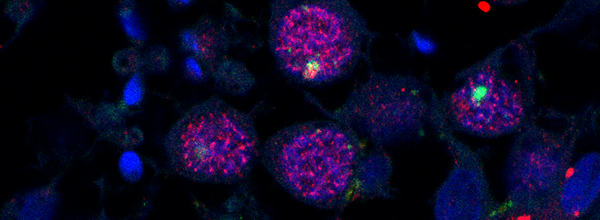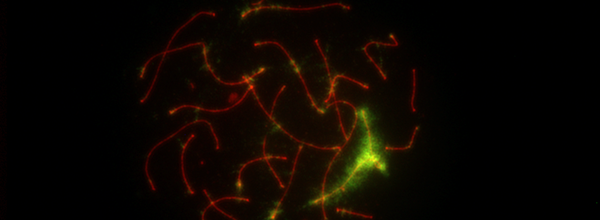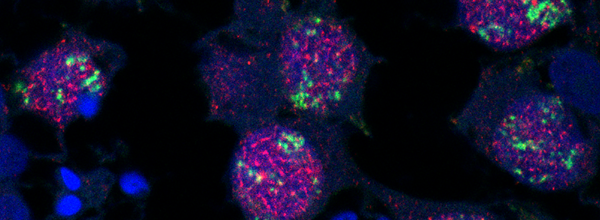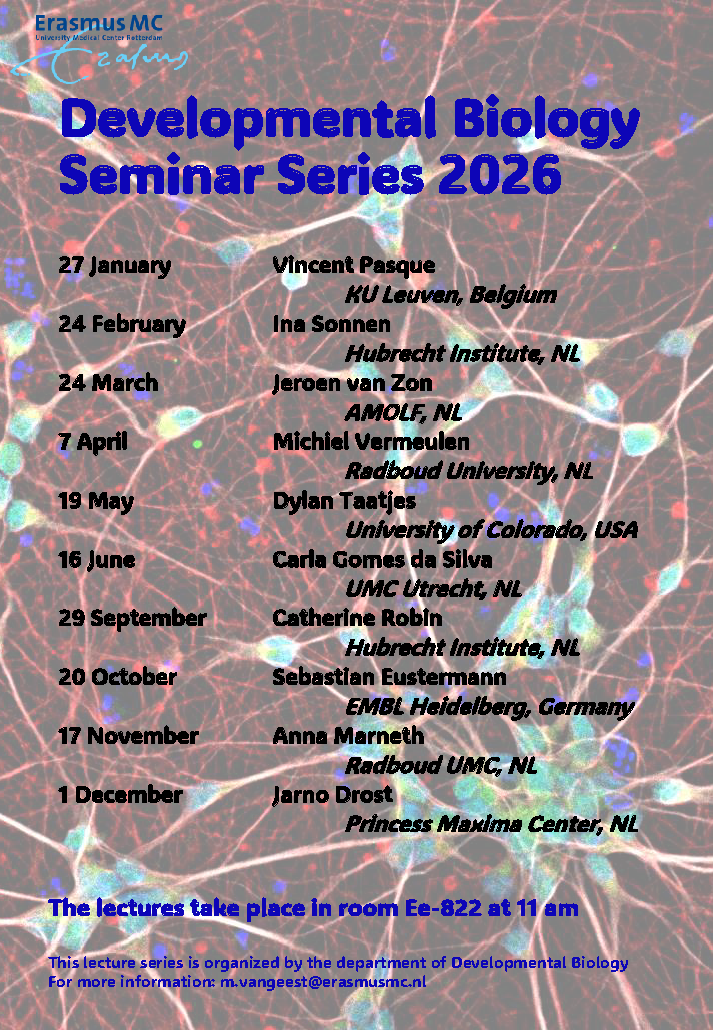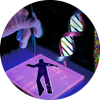About our Department
Our mission
The mission of the Department of Developmental Biology is to advance our understanding of the mechanisms that govern the development, differentiation and regeneration of cell types, tissues, and organs from cell signalling to gene regulation. We aim to translate these insights into model systems to study homeostasis and disease, and to develop novel diagnostic and therapeutic tools to improve health care in and outside the Erasmus MC.
Visiting address
Erasmus MC - Dept. of Developmental Biology
Dr. Molewaterplein 40 - Ee971
3015 GD Rotterdam
The Netherlands
phone +31-10-7043169
email m.vangeest@erasmusmc.nl
Principal Investigators
Research line: Embryonic Development and Disease Modeling
|
Debbie van den Berg Derk ten Berge Menno Creyghton Gert Jansen Raymond Poot Peter Verrijzer Kerstin Wendt |
Sex Differences in Health and Disease Adult Stem Cells and Tissue Regeneration
|
Willy Baarends (department head) Cristina Gontan Pardo Joost Gribnau |
Hélène Gleitz Sjaak Philipsen Rebekka Schneider |
Affiliated and/or embedded research groups:
Esther Baart
Preimplantation human development
Gijsje Koenderink - TU Delft
Robbert Rottier
Lung development
Niels Gajart and Sreya Basu
Control of cell shape and function
Research Lines
Research at the Department of Developmental Biology is centered on understanding development and stem cell differentiation across multiple levels, from cell-cell communication to gene regulation. Our focus lies in elucidating how gene regulatory mechanisms govern cell state transitions, which we study using innovative technologies designed for precise cellular interrogation. Our department studies a broad range of tissues and associated diseases to support the diverse clinical and research needs of the Erasmus MC community; this diversity is strategically unified by our focus on gene regulation and developmental processes. This shared mechanistic foundation enables us to build disease models, develop therapeutic interventions, and design diagnostic tools with high translational potential. Our research is organized around three main lines of research:
1. Embryonic Development and Disease Modeling
We investigate development throughout the cycle of life from gametogenesis to organogenesis using a multi-level approach, focusing on all levels of gene-regulation, to understand cell state changes and establish model systems to inspire strategies for diagnosis and treatment of disease.
2. Sex Differences in Development and Disease
We study the mechanisms of sex-specific aspects of chromosome regulation during germ cell development, and X-chromosome inactivation to understand how these processes contribute to disorders of sex development, infertility, and sex-specific variability in disease susceptibility and treatment responses.
3. Adult Stem Cells and Tissue Regeneration
We investigate how adult stem cells interact with their niche to maintain tissue homeostasis, respond to injury, and contribute to regeneration, aiming to uncover mechanisms of disease progression and develop therapeutic strategies.
Research line 1: Embryonic Development and Disease Modelling
Principal Investigators: Debbie van den Berg, Derk ten Berge, Menno Creyghton, Gert Jansen, Raymond Poot, Peter Verrijzer, Kerstin Wendt This research line aims to improve our understanding of human developmental cell state transitions and their relevance for human embryonic development and disease. We use state-of-the-art single cell transcriptomic and epigenomic applications and develop novel sequencing-based technologies for cell state tracing. We use cutting edge genetic variant transcription technology and artificial intelligence to predict disease risk from genomic variants and mutations. Furthermore, we are establishing new model systems to study pre- and post-implantation human embryonic development including whole embryo models designed exclusively from embryonic stem cells. Our models thereby provide unique opportunities to study and diagnose human development and disease in vitro, as they resemble true developmental processes more closely. New insights in cell-cell communication and downstream actors governing cell state changes are being applied to improve and accelerate differentiation protocols for human induced pluripotent stem cells (iPSCs) and to improve culture conditions and selection criteria for fertilized embryos in the clinic. With the TU-Delft, we are developing a high-throughput automated pipeline for generation of patient iPSCs and differentiated derivatives for diagnostic purposes, disease modelling and treatment testing. Aims: Research line 2: Sex Differences in Development and Disease Principal Investigators: Willy Baarends, Cristina Gontan Pardo, Joost Gribnau Research line 2 aims to understand how a distinct sex chromosome composition contributes to differential disease susceptibility between sexes for a wide range of diseases. We investigate the biological processes that govern sex-specific development of the gonads and the formation of male and female gametes, using mouse model and in vitro organoid approaches, as well as cutting edge microscopy together with the OIC imaging facility and TU-Delft. In addition, we study effects of sex-chromosome dosage and X-chromosome inactivation (XCI) on disease susceptibility throughout the cycle of life; from before conception (IVF), during pregnancy (embryonic development and placental function), through childhood (neurodevelopmental disorders) and adulthood (cardiovascular disease, autoimmune diseases and cancer). We improve our understanding of the XCI process through identification of new factors that direct XCI. These new insights are applied to improve culture conditions for human female iPSCs that are currently instable due to loss of XCI, thus improving relevance of female iPSCs as disease models. In addition, we develop human iPSC-based models to study sex-specific aspects of gametogenesis, and X-linked neurodevelopmental diseases. Together with the TU-Delft we also develop organ-on-a-chip technology for in-depth disease analysis and therapy development. We expect our efforts to lead to an improved understanding of sex specific disease risk factors which can function as early biomarkers in a sex specific manner and the development of sex specific treatment strategies. Aims: Research line 3: Adult Stem Cells and Tissue Regeneration Principal Investigators: Helene Gleitz, Sjaak Philipsen, Rebekka Schneider Research line 3 aims to better understand the signals that adult stem cells send and receive to direct homeostasis, cell differentiation and regeneration. A better understanding of how adult stem cells communicate with each other and with their microenvironment is critical to understand disease development and to develop therapies. Our research focuses on various adult stem cells and their niches, with a main focus on the hematopoietic system, but also on gut, kidney and skeletal muscle. We focus on identifying homeostatic cues and signals that hematopoietic stem cells send out and receive, and how aberrant signaling triggers remodelling of the microenvironment (also termed niche), including the most extensive form of niche remodelling which is fibrosis. Using in vitro and in vivo models, and patient samples, we investigate inhibitors of actionable targets, and identify new actionable targets in the development of chronic blood cancers, with the goal to translate these findings to patients. We improve our understanding of gene regulation in hematopoietic stem cell differentiation and apply this knowledge to develop therapies for disturbed erythroid differentiation leading to anemias. Furthermore, we study differentiation and regeneration of stem cells in the intestine and skeletal muscle and apply this knowledge to identify targets for improvement of the regeneration process. Aims:
• Dissect the regulatory pathways directing cell state changes during embryonic development.
• Generate tools to provide disease risk diagnosis from whole genome information.
• Define proper differentiation conditions for in vitro generation of (im)mature cell types from stem cells, to model healthy and diseased tissue states.
• Understanding the mechanisms that govern male- and female-specific aspects of gonad development and gamete formation.
• Dissect the molecular mechanisms directing XCI.
• Define the role of X-linked gene dosage between sexes in variability in disease susceptibility and treatment response.
• Dissect the inter-cellular crosstalk between hematopoietic stem cell and the niche in health and disease.
• Develop therapies to restore cell function of the hematopoietic stem cell and red blood cells in disease.
• Gain new molecular insights adult stem cell differentiation and regeneration.
Facilities
|
✅ |
Erasmus MC iPS core facility |
